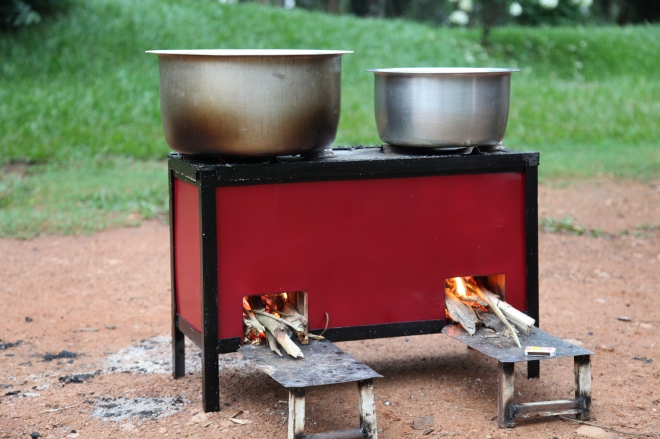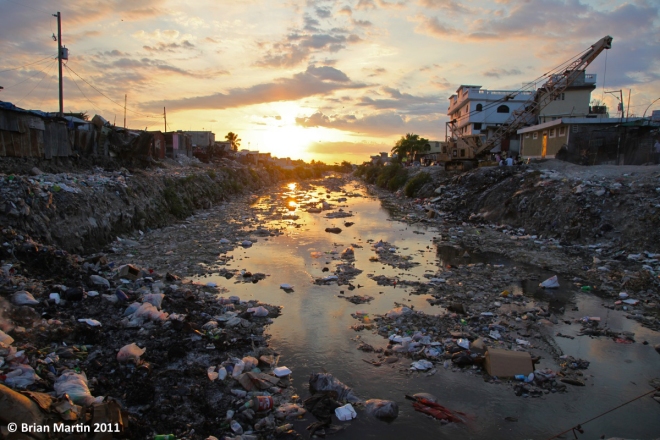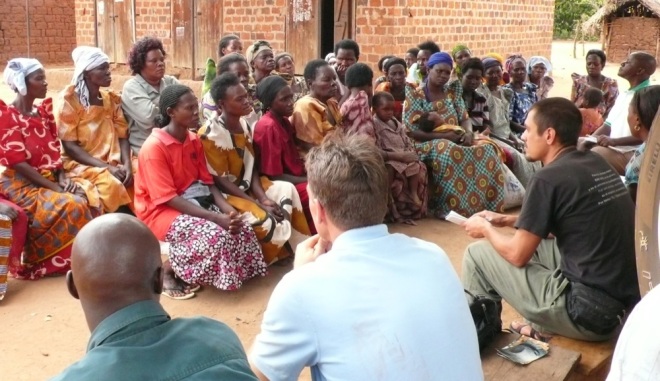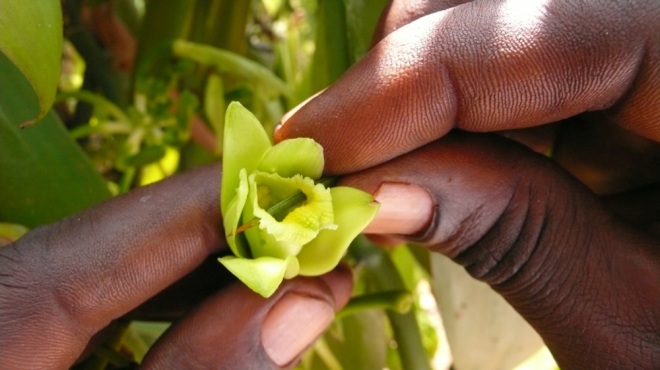
Read more about the Uganda clean cookstove project here and here.
 TWP’s Deputy International Director, Sebastian Africano, just returned from a 2 week trip to Uganda where he visited our newest clean cookstove project. This new project, funded by Rodelle, the largest vanilla importer in the United States, is bringing clean cookstoves to Ugandan vanilla farmers.
TWP’s Deputy International Director, Sebastian Africano, just returned from a 2 week trip to Uganda where he visited our newest clean cookstove project. This new project, funded by Rodelle, the largest vanilla importer in the United States, is bringing clean cookstoves to Ugandan vanilla farmers.
About 75% of families in Uganda cook over open wood fires and cannot afford electric or gas stoves or access to alternative fuel sources. These open wood fires create serious problems including deforestation, greenhouse gas emissions, and disease from indoor air pollution. With this project, Rodelle hopes to improve the livelihoods of the farmers that they source their vanilla from.
On this last trip, Sebastian made visits to households that received clean cookstoves in March 2011 t o determine how they liked the stoves and what improvements they would like made to the stoves. In addition, he built an institutional clean cookstove for workers at UVAN, a top Ugandan exporter of vanilla. The UVAN staff were impressed by the efficiency of their new stove and how much it reduced the smoke in the building where they cook. They were so happy they built a second stove after Sebastian left!
o determine how they liked the stoves and what improvements they would like made to the stoves. In addition, he built an institutional clean cookstove for workers at UVAN, a top Ugandan exporter of vanilla. The UVAN staff were impressed by the efficiency of their new stove and how much it reduced the smoke in the building where they cook. They were so happy they built a second stove after Sebastian left!
 Notes from the Field by Sebastian Africano, TWP’s Deputy International Director:
Notes from the Field by Sebastian Africano, TWP’s Deputy International Director:April 21st, 2011: Port-au-Prince, Haiti

As we begin to wrap up our Spring 2011 site visits, we begin to reflect on all that has passed since we left Fort Collins several weeks ago. My adventure began in Kenya in late February, where I spoke at the 2011 UNEP Sasakawa Prize Ceremony in celebration of this year’s laureates and the International Year of the Forest. This was followed by a 2-week trip to Uganda, where along with Fort Collins based partners, Rodelle Vanilla, we launched what will become TWP’s first African stove program. Soon after we found ourselves in Guatemala, traveling the country meeting with potential new partners in the country’s Altiplano, and then El Salvador, where we visited our partner Agua y Arboles para El Pueblo’s (AAP) new projects in communities surrounding an important protected area, Cerro El Aguila. This trip was punctuated by visits to their spectacular tree nursery, which is teeming with 28 species that will be planted throughout the country this rainy season. This journey will end 10 days from now in Haiti, where we are halfway into a visit with partners International Lifeline Fund (ILF) in Port-au-Prince, and working hard to get our urban stove commercialization project off the ground.

Upon arrival to Haiti, and with the invaluable support of stove design consultant Brian Martin of Portland, Oregon, we headed into the field to check on stoves distributed 2 months ago, during Brian’s last visit. We collected valuable feedback from about 20 families, which began a discussion around design modifications, improvements, and production strategies. We then assembled a group of ten tin-smiths, some of which had worked with Brian and ILF in the past, who have now been contracted to cut and assemble 1,000 cookstoves in the next six weeks. No small feat, by any measure, but cohesion amongst the team members has been quick to form, and all share ideas, help eachother with challenging pieces, and take time to laugh and joke with us as they work.
This week has consisted of getting to know our resource and talent pool, bringing in tools, equipment and materials from all over Port-au-Prince to centralize production at ILF’s offices in the capital. We introduced power tools to the stove production process, which is a break from the norm, but which has increased consistency and speed, allowing us to reach impressive volumes quickly. The office is now filled with a cacophony of metal-on-metal pings, bangs and crashes, as hundreds of charcoal bowls and other parts roll off the production line. Centralizing production without a factory site is challenging, but allows us to improve standardization of our product while offering these skilled metal workers a positive change of environment – getting them away from rough neighborhoods characterized by burning trash, dilapidated buildings, crowds and traffic. All in all, these workers have embarked on what we hope will be an uplifting rise out of poverty, gaining access to steady and dignified employment in what we intend to develop into a significant charcoal stove manufacturing operation over the next year.
Keep your eyes and ears on the Zanmi Pye Bwa (Friend of the Forest) project as it develops, and support TWP by spreading the word as we raise funds to increase our production capacity and impact over the coming months!
*Many thanks to Brian Martin (Working Hands Productions) for the wonderful photos from Haiti.

 In partnership with Rodelle Vanilla, Trees, Water & People is working to provide Ugandan vanilla farmers with clean cookstoves. These stoves will improve families’ lives by decreasing indoor air pollution, deforestation and fuelwood costs.
In partnership with Rodelle Vanilla, Trees, Water & People is working to provide Ugandan vanilla farmers with clean cookstoves. These stoves will improve families’ lives by decreasing indoor air pollution, deforestation and fuelwood costs.
While in Uganda, Sebastian held cookstove focus groups in the local villages to determine the preferences and needs of women who will be receiving clean cookstoves. Information gathered from these focus groups helps in design and implementation of a successful cookstove program.
About 75% of families in Uganda cook over open wood fires and cannot afford electric or gas stoves or access alternative fuel sources. These open wood fires create serious problems including deforestation and greenhouse gas emissions. In an effort to alleviate these issues Rodelle and Trees, Water, & People will provide fuel-efficient cookstoves made from sustainable materials. This new project will work with the local farmers and people of Uganda to lay the groundwork for a better future. In creating a sustainable system, Rodelle Vanilla hopes to also create an industry that uplifts the Ugandan economy, all while changing lives.
Enjoy these pictures from Sebastian Africano’s (TWP Deputy International Director) recent trip!

Notes From the Field by Sebastian Africano, TWP’s Deputy International Director:
BEEP! While shocked that my Ugandan cell phone had been able to pick up a text message at 630am, GMT+3 in the outskirts of Gayaza, Uganda, the message that followed was even more unexpected: “A long dry season has been predicted. Expect shortages of food, water & pasture. Store food and water to avoid hunger. – The Office of the Prime Minister.”
I reflected back to the focus group we had held the day before with 30 women – wives of smallholders on the western banks of the Nile – where dust whipped through our conversation for the entire hour, as if to shush their aspirations and keep us from meaningful conversation.

But I know that their opinion is secondary – everything here depends on the rains… and the rains have not come.
The vanilla crop this year is down. Coffee, plantains and cassava aren’t doing much better. Many are worried. But these families have an advocate – in fact several – which through long-term planning, foresight, and decisive action are trying to ease their concerns. UVAN, a top Ugandan exporter of vanilla, and the company that has brought me here, pays a premium for their beans (almost 3 times more than the international price), and provides farmers and their families with extension services in health, livelihoods and environment – a service few companies of this nature would be willing to invest in.

UVAN is supported in their work by almost all of their buyers – it is part of the culture that the founder, Aga Sekalala, has instilled in his business, and he has remained true to it. One of his partners is Fort Collins, CO based Rodelle Vanilla (www.rodellevanilla.com), which happily pays the premium price for the beans Sekalala collects from his network of 9,000 farmers. They also proudly support the extension services that UVAN provides, which teach farmers to thin their shade trees responsibly, to intercrop, to check-in regularly with UVAN’s mobile health services, and to seek support from UVAN’s savings and microloans programs, rather than harvesting prematurely to make a quick return in tough times.
So when Rodelle asked Trees, Water & People to advise them and UVAN as they launched a fuel-efficient cookstoves program for their farmers, we jumped at this unique opportunity.

One week into the project, we have traveled all over this amazing region meeting with women, with other NGOs acting locally, and with a range of stove manufacturers, slowly forming the foundation for what promises to be a far-reaching social and environmental contribution to this broad community of rural families, reducing the firewood they consume and cleaning the indoor air in their kitchens.

Our goals are ambitious for the coming week, but we have had tremendous good fortune in building a strong network for the project, and UVAN’s extension team is one of the most impressive I’ve ever worked with. So when I leave – one week from tomorrow – I know I will leave exhausted, but gratified to have had the opportunity to serve UVAN, Rodelle Vanilla and their network of farmers, and to have contributed to easing one concern that these families have as they wait for the rains to fall.
Read more about this new partnership in this recent article from the Coloradoan.